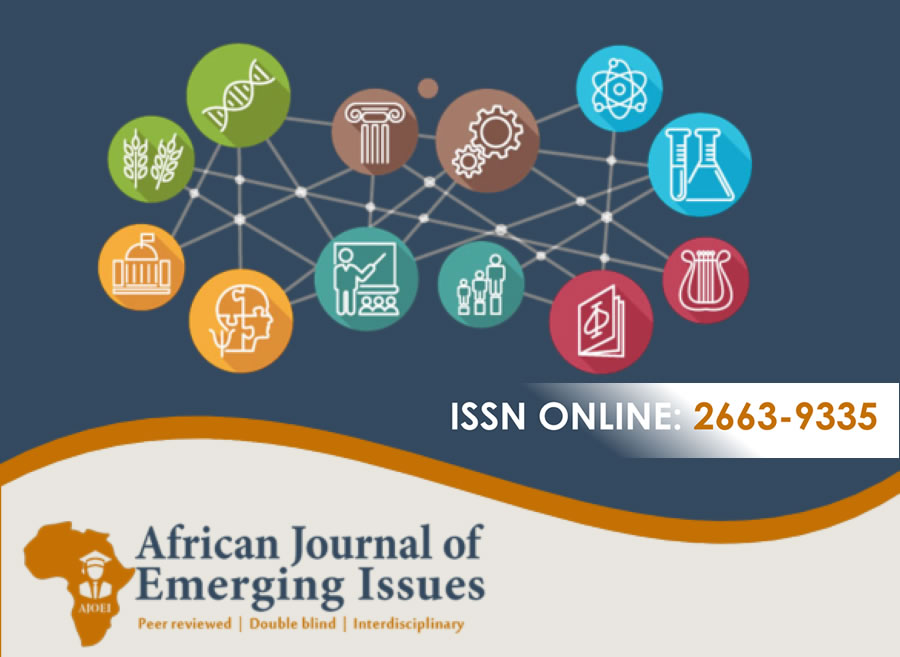SOCIO-DEMOGRAPHIC FACTORS THAT INFLUENCE EMOTIONAL DYSREGULATION AMONG YOUTH IN SELECTED REHABILITATION CENTRES IN KIAMBU COUNTY, KENYA
Abstract
Purpose of the Study: The study investigated the socio-demographic factors influencing emotional dysregulation among young adults with substance use disorder (SUD) in selected rehabilitation centres in Kiambu County, Kenya.
Problem Statement: Despite the availability of rehabilitation services, relapse rates among youth with SUD remain high. Emotional dysregulation is a major driver of relapse, yet most rehabilitation programs focus on detoxification, peer support, and counseling while overlooking structured interventions for managing emotional instability. International evidence highlights the influence of socio-demographic variables such as age, gender, education, and social support on emotional regulation, but limited research has examined these factors within Kenyan rehabilitation settings.
Methodology: A quasi-experimental design was adopted, involving 108 inpatients aged 18–35 years across four rehabilitation centres. A sample of 68 participants was purposively and randomly assigned into experimental and control groups. Data were collected using standardized self-report tools, including the Difficulties in Emotion Regulation Scale (DERS-16), Beck Anxiety Inventory (BAI), Beck Depression Inventory-II (BDI-II), and the Brief Substance Craving Scale (BSCS). Data analysis employed chi-square tests, Pearson correlations, regression analysis, ANOVA, paired t-tests, and effect size calculations.
Results: Findings revealed that 89.8% of participants exhibited some level of emotional dysregulation, with 51.9% presenting moderate and 14.8% severe levels. Socio-demographic factors including age, gender, education, and family structure, were significantly associated with emotional dysregulation and influenced vulnerability to relapse. Difficulties with impulse control, emotional awareness, and coping strategies were particularly evident.
Conclusion: The study concludes that emotional dysregulation remains pervasive among youth with SUD in Kiambu County, with socio-demographic characteristics shaping its severity and impact on recovery outcomes.
Recommendations: The study recommends that rehabilitation programs integrate Dialectical Behavior Therapy (DBT) while tailoring interventions to socio-demographic realities to strengthen coping skills, reduce cravings, and improve long-term recovery. Policymakers should prioritize evidence-based models like DBT and expand professional training to enhance treatment effectiveness.
Keywords: Emotional dysregulation, socio-demographic factors, substance use disorder, Dialectical Behavior Therapy, Kenya, youth, rehabilitation
References
Azagba, S., Shan, L., & Latham, K. (2021). Overcoming impulsivity in youth substance use: The role of emotional regulation. Journal of Substance Abuse Treatment, 127, 108364. https://doi.org/10.1016/j.jsat.2021.108364
Bitta, M., Kariuki, S. M., & Newton, C. R. (2019). An overview of substance use and treatment approaches in Kenya. African Journal of Psychiatry, 22(1), 1–8. https://doi.org/10.4102/sajpsychiatry.v22i1.1325
Chen, J. (2021). Emotional dysregulation and substance use among adolescents: A systematic review. Journal of Adolescence, 89, 93–104. https://doi.org/10.1016/j.adolescence.2021.04.009
Dhumal, V., Singh, R., & Patel, S. (2021). Rehabilitation challenges in managing emotional stressors among youth with substance use disorders. International Journal of Mental Health and Addiction, 19(5), 1347–1362. https://doi.org/10.1007/s11469-020-00253-9
Dimeff, L. A., Rizvi, S. L., Brown, M. Z., & Linehan, M. M. (2021). Dialectical behavior therapy for substance abusers. Guilford Press. https://doi.org/10.1007/978-1-4615-4381-7
Harvey, P. D., Sharma, T., & Nunez, R. (2019). Emotional regulation and relapse in substance use disorders. Journal of Dual Diagnosis, 15(3), 174–184. https://doi.org/10.1080/15504263.2019.161134
Karanja, P., & Kipchumba, J. (2024). Relapse patterns among youth in Kenyan rehabilitation centres. East African Medical Journal, 101(2), 55–63.
Kimani, P., & Wambua, M. (2022). Urban influences on youth substance use in Kiambu County, Kenya. African Journal of Drug and Alcohol Studies, 21(3), 47–60. https://doi.org/10.4314/ajdas.v21i3.6
Lam, R. W., & Wolfe, B. (2022). Gender differences in emotion regulation and treatment outcomes for substance use disorders. Addictive Behaviors, 132, 107360. https://doi.org/10.1016/j.addbeh.2022.107360
Linehan, M. M. (1993). Cognitive-behavioral treatment of borderline personality disorder. Guilford Press.
Linehan, M. M. (2015). DBT skills training manual (2nd ed.). Guilford Press.
Maciejewski, P. K. (2018). The role of cognitive-behavioral approaches in substance use treatment. Addiction Science & Clinical Practice, 13(1), 13. https://doi.org/10.1186/s13722-018-0110-0
Montaser, T., Ali, A., & Mahmoud, H. (2023). Emotional dysregulation as a predictor of relapse in substance use disorder. Journal of Substance Use, 28(2), 190–198. https://doi.org/10.1080/14659891.2022.2157342
Mwangi, J., Ndirangu, T., & Wambui, P. (2021). Effectiveness of dialectical behavior therapy in reducing emotional distress among youth in Kiambu County rehabilitation centres. Kenya Journal of Psychology, 5(1), 77–89.
NACADA. (2020). Status of drugs and substance abuse in Kenya. National Authority for the Campaign Against Alcohol and Drug Abuse. https://nacada.go.ke
NACADA. (2022). Kenya national survey on the status of drug and substance use (2022). National Authority for the Campaign Against Alcohol and Drug Abuse. https://nacada.go.ke
Ndirangu, T., Kamau, S., & Waweru, M. (2022). Enhancing interpersonal effectiveness in rehabilitation: A DBT group therapy approach in Kenya. African Journal of Psychology, 14(2), 102–116.
Osborn, D., Mutiso, V., & Ndetei, D. M. (2020). Approaches to substance use treatment in Kenyan rehabilitation centres. BMC Psychiatry, 20, 415. https://doi.org/10.1186/s12888-020-02810-7
Rady, A., Sallam, K., & El-Sayed, M. (2021). Emotional dysregulation as a risk factor for anxiety, depression, and substance use. Middle East Current Psychiatry, 28, 1–9. https://doi.org/10.1186/s43045-021-00096-4
Rezaei, S., Mohammadi, M., & Farhadi, A. (2019). Emotional dysregulation and coping strategies in substance use relapse. Substance Abuse Treatment, Prevention, and Policy, 14, 32. https://doi.org/10.1186/s13011-019-0216-2
Siedlecki, K. L. (2020). Mindfulness and emotional clarity in regulating substance use among young adults. Mindfulness, 11(8), 1907–1918. https://doi.org/10.1007/s12671-020-01407-9
Stellern, J., Smith, R., & Koller, J. (2023). The impact of DBT on cravings and impulsivity in young adults with substance use disorders. Journal of Clinical Psychology, 79(1), 45–59. https://doi.org/10.1002/jclp.23378
Wangensteen, T., & Hystad, S. (2022). Emotional regulation and relapse risk among youth in substance rehabilitation. International Journal of Psychology, 57(6), 843–852. https://doi.org/10.1002/ijop.12854
Weaver, K. (2022). The role of theoretical frameworks in behavioral research. Journal of Behavioral Research, 34(2), 145–159. https://doi.org/10.1177/009365022210754





